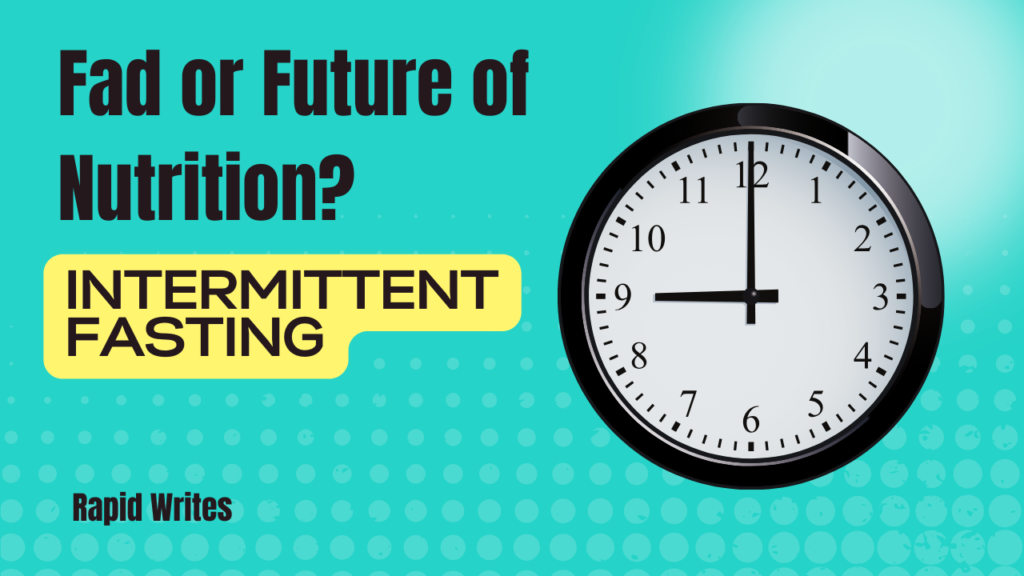Introduction
In an era where diet trends come and go with the seasons, intermittent fasting (IF) stands out for its simplicity and the profound impact it claims to offer on health and wellness. Unlike diets that meticulously dictate every calorie and carb, IF focuses on the timing of meals, offering a flexible approach to eating that has captivated health enthusiasts worldwide. This blog delves into intermittent fasting, exploring the science behind it, its potential health benefits, and considerations for those looking to embark on this dietary journey.
Understanding Intermittent Fasting
Intermittent fasting isn’t about what you eat but when you eat. It alternates between periods of fasting and eating, with the most common methods being the 16/8 method (fasting for 16 hours and eating during an 8-hour window), the 5:2 method (eating normally for five days of the week while significantly reducing calorie intake for two non-consecutive days), and the Eat-Stop-Eat method (engaging in a 24-hour fast once or twice a week).
The Science Behind IF
The appeal of intermittent fasting lies in its impact on the body’s internal clock, or circadian rhythm, and its interaction with our metabolism. During fasting periods, several things happen in the body on the cellular and molecular level. For instance, the body adjusts hormone levels to make stored body fat more accessible as energy, cells initiate important repair processes, and changes occur in gene expression related to longevity and protection against disease.
Key benefits highlighted by research include:
- Weight Loss and Body Fat Loss: IF can lead to a reduced calorie intake, increased metabolic rate, and more effective fat burning, aiding in weight and body fat loss.
- Improved Insulin Sensitivity: Fasting can decrease blood sugar levels by 3-6% and fasting insulin levels by 20-31%, reducing the risk of type 2 diabetes.
- Heart Health: IF has been shown to improve numerous risk factors for heart disease, such as inflammatory markers, blood pressure, cholesterol levels, triglycerides, and blood sugar levels.
- Brain Health: Fasting increases the brain hormone BDNF and may aid the growth of new nerve cells. It also may protect against Alzheimer’s disease.
Potential Health Benefits
Beyond the benefits mentioned above, intermittent fasting may also offer:
- Extended Lifespan: Some animal studies suggest that intermittent fasting can extend lifespan, though human studies are needed to confirm this effect.
- Cancer Prevention: Emerging research indicates that fasting may help prevent cancer, though more research is needed.
- Improved Cellular Repair: Fasting triggers autophagy, a process that removes old and dysfunctional proteins from cells, potentially contributing to disease prevention.
Considerations for Safe Practice
While intermittent fasting shows promise, it’s not for everyone. Prior to starting an IF regimen, consider the following:
- Consult with a Healthcare Provider: Especially important for individuals with underlying health conditions.
- Mindful Eating: Focus on nutrient-dense foods during eating windows to ensure your body gets essential nutrients.
- Listen to Your Body: Be mindful of how your body responds to fasting and adjust accordingly.
- Special Populations Caution: Pregnant women, individuals with a history of eating disorders, and those under 18 should not practice IF without medical supervision.
Conclusion
Intermittent fasting represents a paradigm shift in the realm of dieting, emphasizing that the timing of meals can be just as crucial as the content. With its promising array of health benefits, from weight loss to improved metabolic health, IF could very well be more than just a passing fad. However, like any dietary strategy, it’s important to approach IF with a balanced perspective, prioritizing overall nutritional needs and consulting with healthcare professionals to ensure it’s the right fit for your health profile and lifestyle. As we continue to explore the vast landscape of nutrition science, intermittent fasting shines as a beacon of potential in the quest for optimal health.



